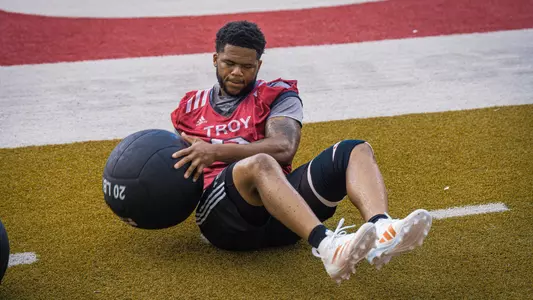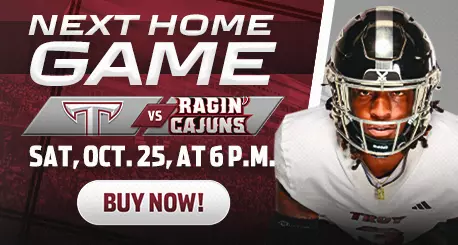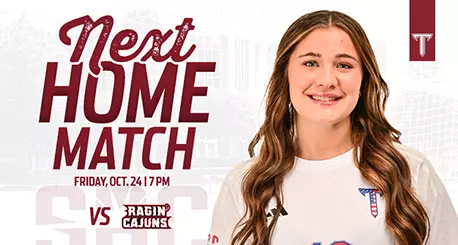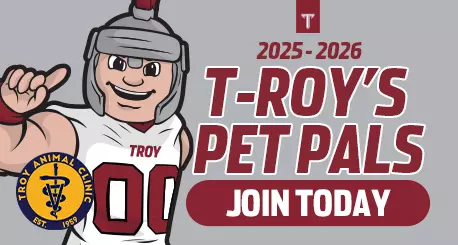Troy University Athletics

Still Waters Run Deep: The Resilient Journey of Trey Cooley
7/18/2025 9:32:00 AM | Football
On the surface, Trey Cooley cuts the figure of a typical college running back: quick feet, sure hands and the kind of balance that coaches covet. But to understand Cooley is to look deeper, to see the story beneath the helmet, the quiet persistence behind the stats and the lessons shaped as much by a fishing rod as by a football.
Roots in Raleigh
For Cooley, football began early at the age of five. Raised in Raleigh, N.C., the game didn't start as love at first snap.
"I hated it at first," Cooley said. "I thought I could just go hit somebody, but I didn't know all the stuff that came with it."
The chaos of pads and whistles almost drove him away. It wasn't until middle school, with encouragement from his eighth-grade coach, Coach Rouse, that he found his way back.
That return became a recurring theme in Cooley's life: comeback after hesitation, reengagement after doubt. Football didn't just offer him a path; it gave him a release.
"Earlier in life, I was getting in a little trouble hitting people," he said. "My grandmother, Diane, she found a way to let me hit people without getting in trouble. That was football."
Finding His Role
Cooley's journey from Raleigh to a collegiate football career has spanned several programs and included battles far tougher than blitzes and broken tackles. After stints at Louisville and Georgia Tech, Cooley now enters his final college season at Troy, a program with a knack for prolific running backs, including three straight 1,000-yard rushers.
"People questioned why I came here," he said. "But this was a choice I made for me and my family. It's tight-knit, and I'm about opportunity. That's all I need."
His voice is calm, but deliberate. There's no posturing, no false bravado. Trey Cooley doesn't talk about what he's going to do; he just does it.
"I'm quiet on the field," he said. "I let my play talk."
And that play speaks volumes. Elusive and explosive, Cooley plays with the instinct of someone who's been absorbing football longer than most. However, it wasn't until his 10th-grade year that he committed full-time to running back. Even now, he brings the perspective of someone who came to the position through necessity rather than design, a shift triggered by injuries and opportunity.
"I started out hitting people. Then I became the one getting hit. That was a transition," he said.
Despite the late commitment to the position, Cooley made an immediate impact. By his first season at running back, he was close to breaking the 1,000-yard mark. Coaches noticed, and the offers came. He committed to Louisville, then later transferred to Georgia Tech, where the stakes grew and so did the challenges.
The Injury and the Dark Place
Last year brought the toughest test of all: a concussion sustained on special teams during the season opener against Florida State in Ireland. It was a blow not just to the body, but to the psyche.
"That was probably the best camp I ever had as a player. Most complete I'd ever felt," Cooley said. "Then the first play of kickoff return – boom. Everything changed."
What followed was a long, painful recovery. Migraines. Light sensitivity. Disrupted routines. The mental toll lingered far longer than the collision itself.
"It put me in a dark place," he said. "I had to lean heavily on my faith."
In that space of uncertainty, Cooley rediscovered his foundation.
"When God gives you what you want, sometimes you forget to lean on Him. That was me," he said. "But I learned. I started praying more. Working out. Talking to my family. My brother (Tamarcus), who plays at LSU, checked on me every day."
Graduating Through the Grind
The physical setbacks were matched by academic pressure. Cooley was still enrolled at Georgia Tech, one of the country's most rigorous institutions, where he was completing his degree in HTS (history, technology and society).
"People don't realize how hard it is to finish school while you're recovering from a concussion," he said. "I couldn't be around light. Couldn't look at screens for long. But we found a way. That degree means a lot. They made it a priority for me, and I'm proud of that."
Final Chapter at Troy
Now at Troy, fully healthy and focused, Cooley sees a final chapter worth writing. The program's recent history of 1,000-yard rushers gives him motivation, but it's not about stats.
"I bring experience," he said. "Speed, yes, home run ability, yes. But mostly I bring perspective."
It's that veteran lens, shaped by injury, disappointment and perseverance, that makes him valuable beyond the field. He mentors younger teammates, like sophomore Jordan Lovett, who frequently picks Cooley's brain.
"That's what it's about for me now, giving back. I've been there, done it. They know that."
Casting for Calm
Still, when it's time to unplug, Cooley returns to one of his oldest rituals: fishing. He doesn't do it for the sport. He does it for what it teaches him.
"Fishing's peaceful. It teaches you life," Cooley said. "You cast out, and sometimes you get nothing. Sometimes you get exactly what you want. Either way, you keep casting."
In that rhythm – cast, wait, reflect – Cooley finds calm. When stress builds, when football feels overwhelming, he finds water. Any water.
"Just go find a spot, cast out. That's all I need."
It's no surprise then, that fishing metaphors slip naturally into his worldview.
"Some people get one fish and get satisfied. I'm always looking for the next one, the bigger one," he said. "That's how I approach football. And life."
Cooley's story isn't loud. It doesn't scream for attention. But it's marked by grit, by patience and by a belief in showing up every time, even when it's hard, especially when it's hard.
He's not out to prove anything to critics, or even to himself. He's here to cast again.
Players Mentioned
Josh Lauer Postmatch Press Conference - Arkansas State (Thurs.)
Friday, October 24
Behind The Wall - S10, E7
Wednesday, October 22
Football Press Conference (Players) - Louisiana Game
Monday, October 20
Gerad Parker Press Conference - Louisiana Game
Monday, October 20











